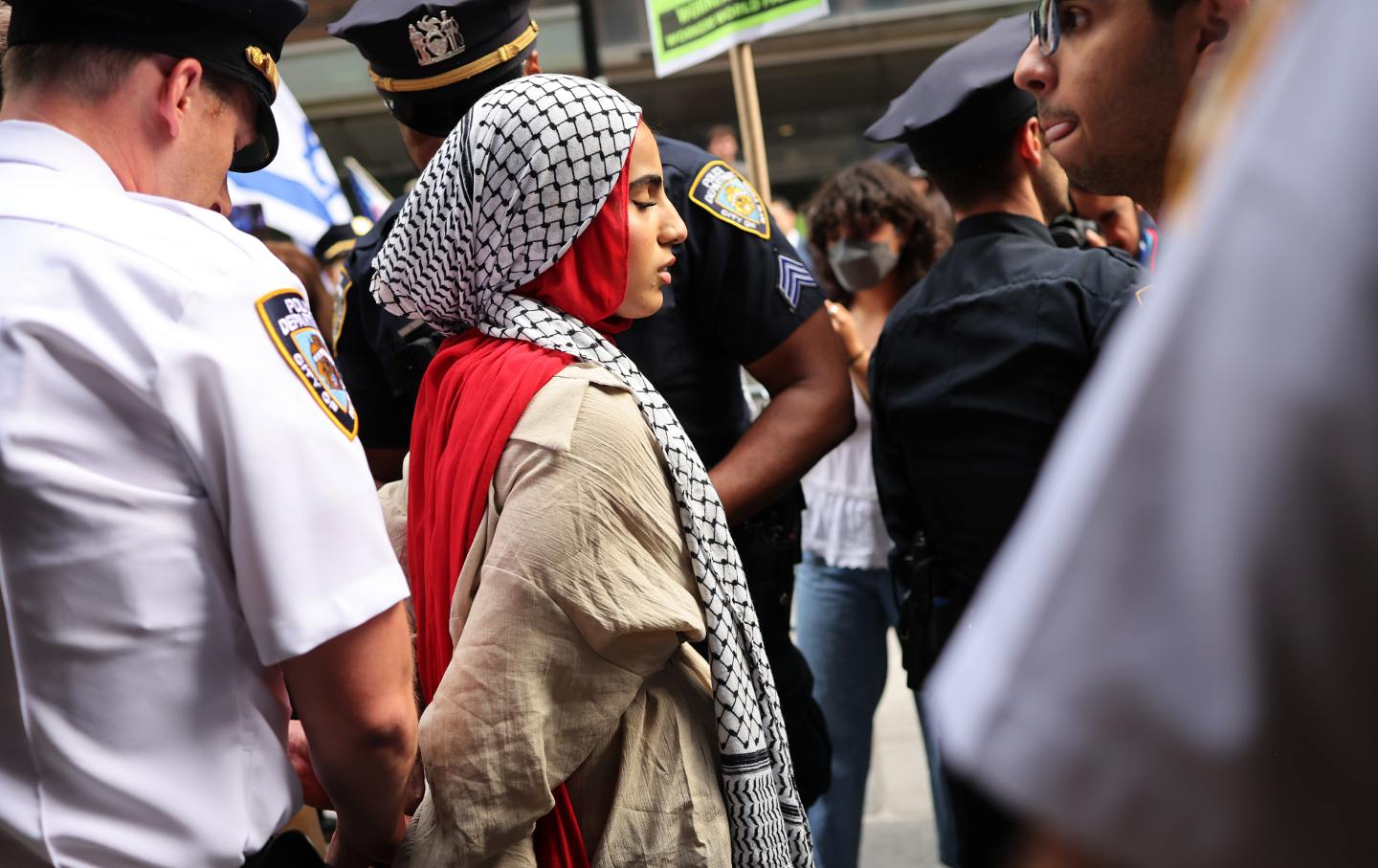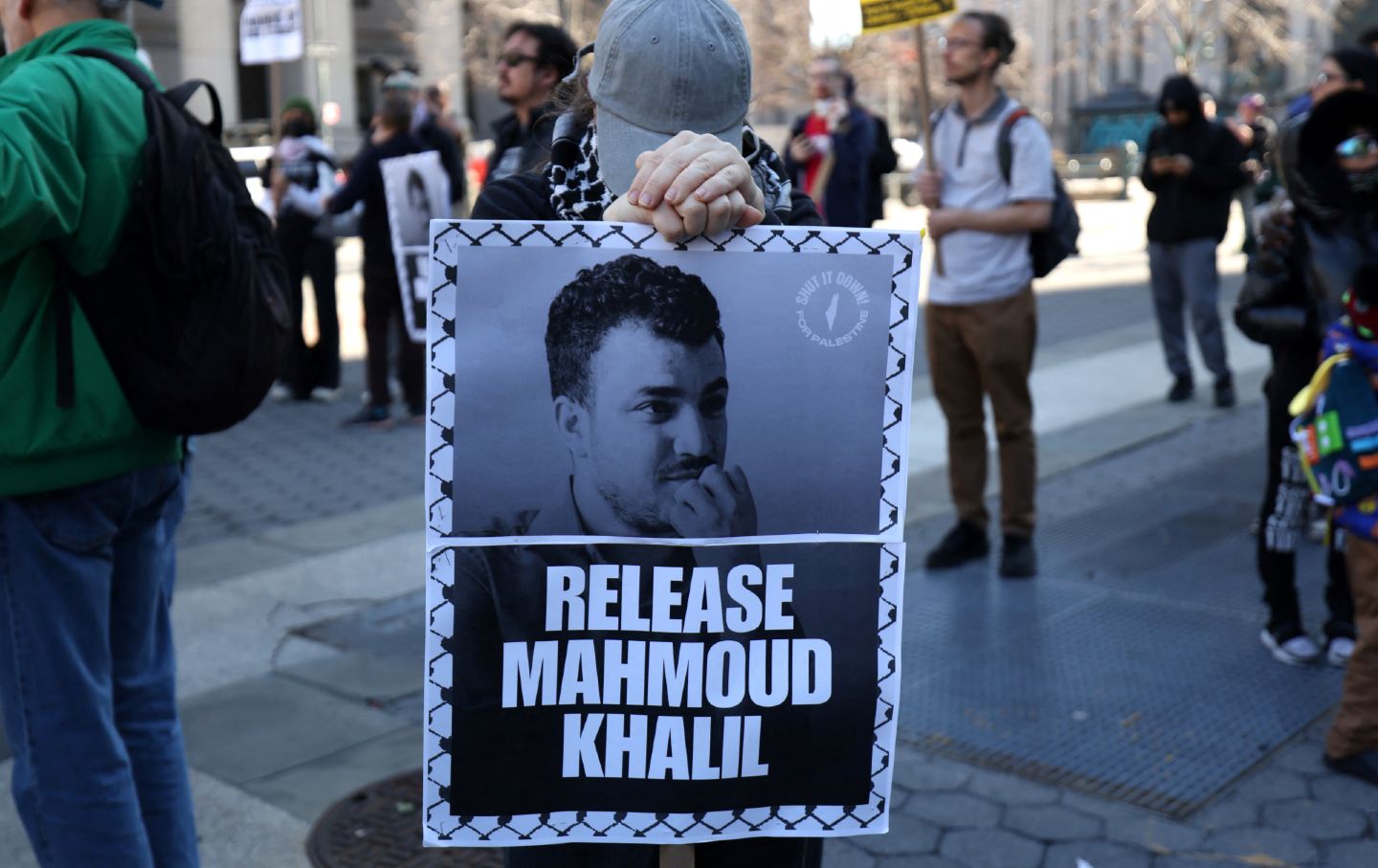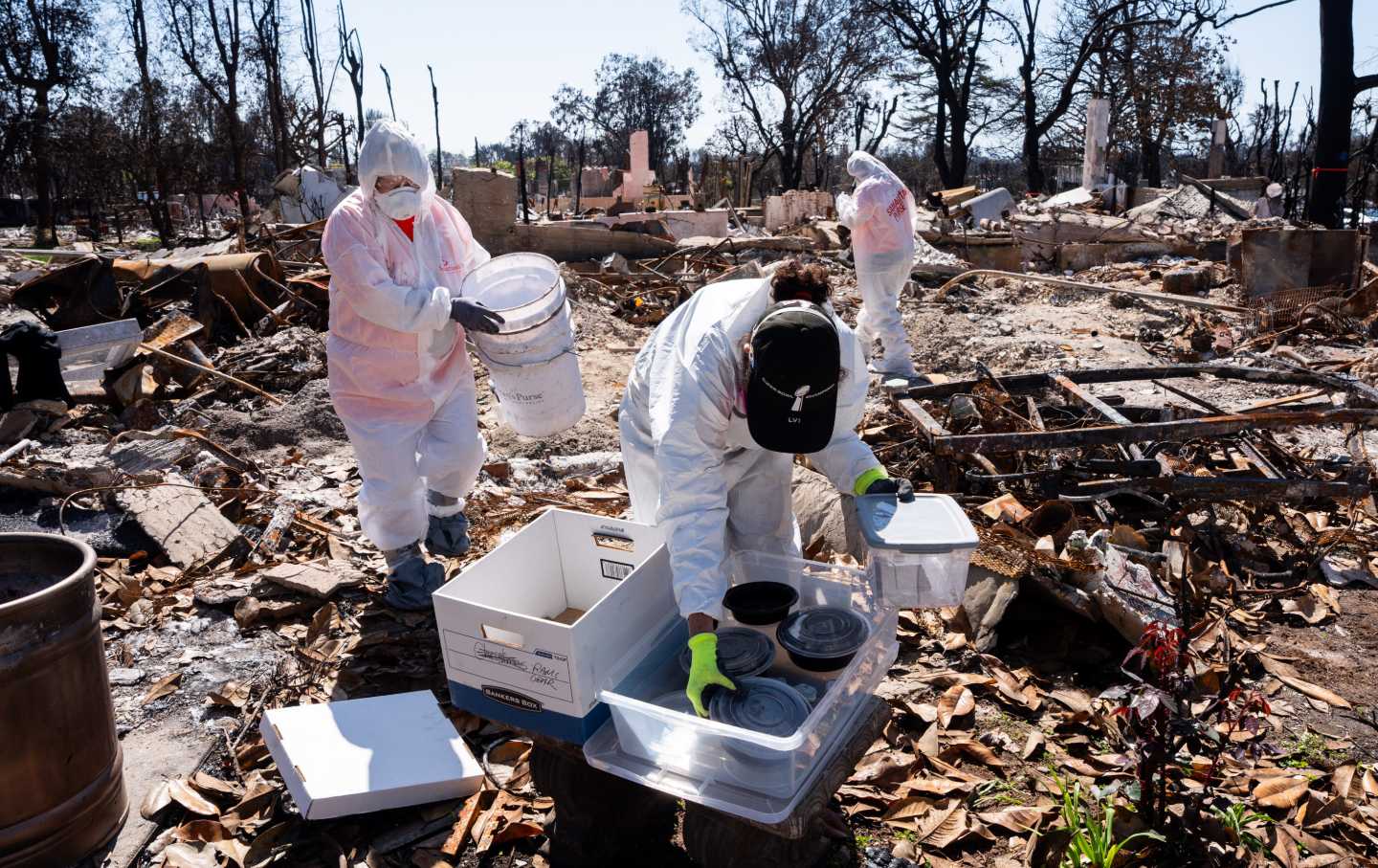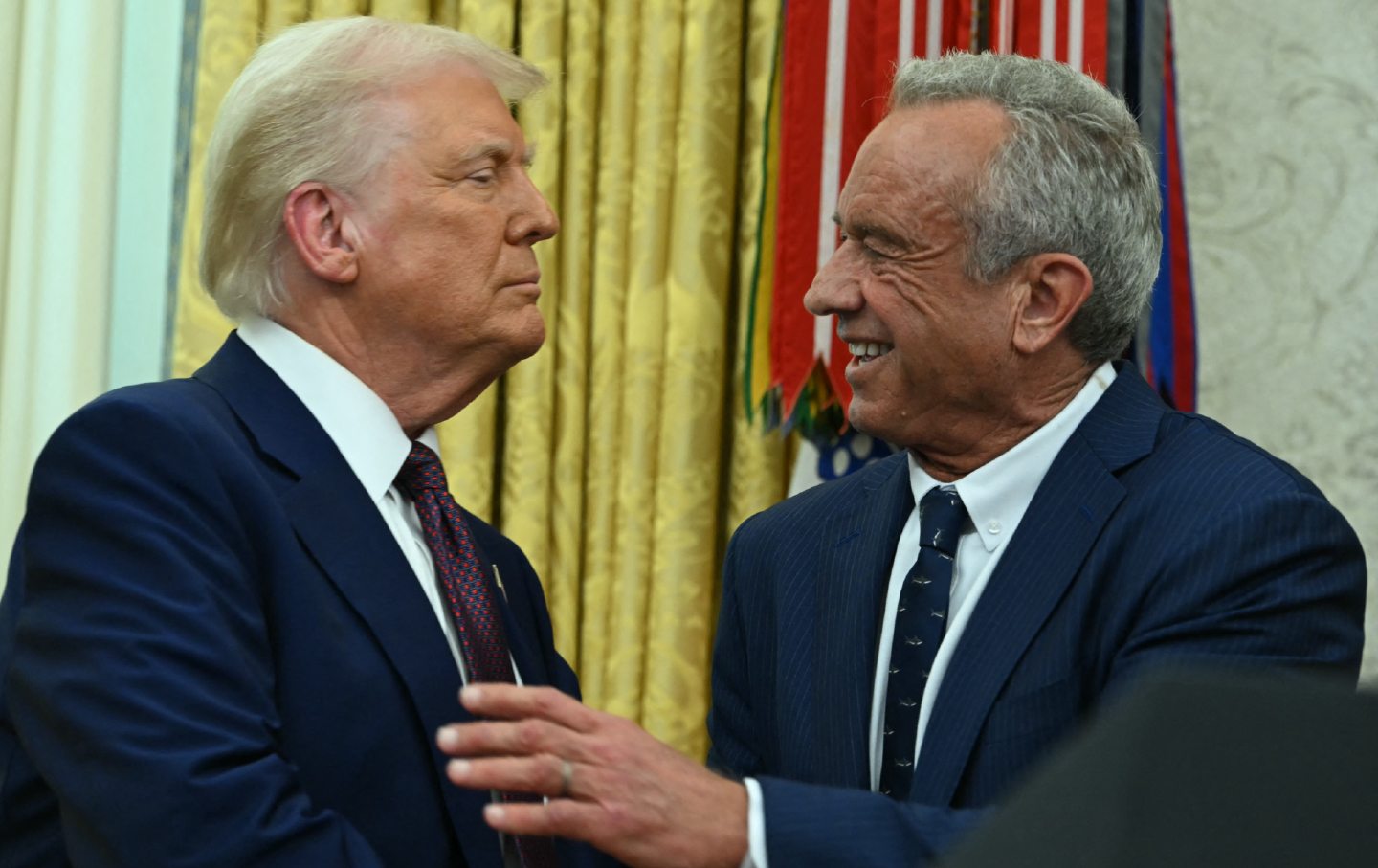Muslim Women Are Having Their Hijabs Torn Off by Police All Over America
Women across the country are having their civil rights blatantly violated while in police custody.

On the morning of April 25, Sumaya Hamadmad, a research scientist at Ohio State University, was sitting in the center of campus when she was arrested for “criminal trespassing.”
Students had formed an encampment to call for the university to divest from Israel earlier that morning, before being dispersed by campus police. When Hamadmad and a friend arrived at the campus Oval—not to protest, but simply to enjoy the sunny morning—there was no crowd left. But the Ohio State Police Department targeted Hamadmad and accused her of attempting to form another encampment. When she started questioning the officers’ false assumptions and orders for her to leave, she was arrested. And when her friend questioned Hamadmad’s arrest, she too was arrested.
Hamadmad was then transferred to a Franklin County jail. There, she was strip-searched and ordered to take off her hijab, a religious head covering worn by Muslim women. Despite making multiple requests to have her hijab returned to her, she was denied any sort of head covering for the 12 hours that she remained in custody. Tucking her arms and hair into her shirt, she did what she could to remain covered.
“I knew the system was broken, but I didn’t truly realize it until I experienced it,“ said Hamadmad, expressing shock at her treatment in jail. “As much as need to fight against our tax money going to fund genocide, we also need to fight against our tax money funding these broken systems of injustice in our own country.”
Hamadmad is not alone in having her religious freedom violated in this way. Multiple incidents of law enforcement officials taking off women’s hijabs against their will have occurred alongside sweeping arrests at pro-Palestine protests. Many of these incidents took place on college campuses. There have been verified reports from students and faculty at least four universities—Arizona State University, Columbia University, Depaul University, and Ohio State University—as well as alleged incidents at several others.
The influx of arrests of Muslim women at pro-Palestine protests highlights a critical flaw in the criminal justice system. The hijab is an expression of a Muslim woman’s faith, symbolizing modesty, privacy, and agency over one’s body, and depriving a woman of that coverage can be humiliating and traumatizing. Muslim women have a clear First Amendment right to keep their heads covered for religious purposes, including in spaces where others might have to remove head coverings. Reflecting this, the Bureau of Prisons allows for incarcerated Muslims to keep their hijabs on in federal prisons, and at least 17 states, including New York, specifically allow for religious head coverings to be worn throughout a prison. Yet there are no federal laws that explicitly protect a woman’s right to keep on her hijab while being arrested, in police custody, or in a temporary holding facility, either for a mug shot or otherwise.
The difficulty that Muslim women have experienced is also reflective of the general vitriol that Muslim women have been facing in activism spaces. (Just look at this video from the University of California, Los Angeles, where pro-Israeli counterprotesters chant at women, “Take off your hijab and get a job.”) And even before pro-Palestine solidarity encampments spread across American universities, many Muslim activists had already been experiencing violations of their religious liberties.
Jinan, a 27-year-old engineer from Maryland who requested to keep her last name anonymous, was arrested in March while protesting in front of the Israeli embassy in Washington, DC.
While in custody, Jinan said she was ordered to take off her hijab for a mug shot. Confused and uncomfortable, she asked countless questions like “Who would be seeing the photos?” and “Do people normally resist here?” But Jinan eventually complied and took off her head covering, fearful that her resistance in the jail would impact the outcome of her charges.
“I felt awful, I felt violated, confused, stunned, naked. I felt the most important thing to me was taken away” said Jinan. “I’m worried about other women. There needs to be a system in place if a hijabi woman, or if a Muslim gets arrested. Where do they pray?”
Jinan was given her hijab back afterward but noted the lack of religious accommodations in prison overall. Since the hijab is typically observed in the presence of men, she wasn’t comfortable using the bathroom in front of male guards, for example, and didn’t have a proper space to pray.
Around the same time, police officers in the Dallas–Fort Worth area forced protesters at the General Dynamics facility in Garland, Texas, to take off their hijabs for a mug shot. In a separate incident in Dallas earlier this year, three women also protesting the US’s complicity in Israel’s war crimes in Gaza, were forced to remove their hijabs for mug shots in view of male officers and visitors, despite explaining to officers the religious significance.
“My arrests were before the encampments, I know it has only gotten exponentially worse,” Jinan said. “I’ve seen how the police have been taking advantage of protesters.”
Popular
“swipe left below to view more authors”Swipe →Hamadmad was not even the only woman to suffer this injustice at OSU on the day she was arrested. Students at the campus eventually formed another encampment later that evening; police then broke up the encampment, arresting 36 people. Mazen Rasoul, an attorney who was present at the scene and is representing many of the students who were arrested, said he saw another woman’s hijab fall off during an arrest. “The violence applied in arresting her [caused her hijab] to fall off her head. But then they deliberately insisted on not putting it back on her head once she was in handcuffs,” he said.
Police ignored multiple requests from both her and witnesses to return her hijab, Rasoul said, until they eventually relented and pulled her hoodie on her head. “I witnessed her full arrest, from the moment she was on the South Oval back to the bus. She was not resisting.” He said that she later had her head uncovered again for a mug shot. Rasoul said the woman was considering pursuing legal action, but has not yet filed a lawsuit.
A spokesperson for the OSUPD told The Nation, “It is possible that some head coverings may have inadvertently come off while officers were attempting to arrest some individuals.”
Rasoul said that before law enforcement “attacked protesters in a very vicious way,” protesters were “peacefully singing, chanting, and praying.” In fact, he said, police began arrests after students lined up and began praying one of the five daily prayers practiced by Muslims. Similarly, the New York Police Department also took the moment that Muslim demonstrators at the New York University encampment started their prayer as an opportunity to make arrests.
Dalal Shalash, a Palestinian who was arrested at the OSU encampment, said at a Columbus City Council meeting on April 29 that she saw three women made to remove their hijabs for mug shots at a Franklin County jail. One did not have her hijab returned until Shalash “made a scene,” demanding that the officers do so.
Shalash compared this violation of the women to the humiliation tactics of the Israeli military. “We had women’s hijabs being forcefully removed, which is all too reminiscent of the humiliation tactics of the IOF, who regularly strip Palestinian women they arrest, for no other reason than to humiliate,” she said at the meeting. According to the United Nations, countless Palestinian women have been subject to sexual assault by the Israeli Defense Forces, which includes strip searches by male officers.
A spokesperson for the Franklin County Sheriff’s Office told The Nation that all detainees were processed in accordance with “constitutional, statutory, and administrative law.”
“Processing arrestees requires accurate identification of the arrestees as well as ensuring that the arrestees do not convey contraband into the facility. With respect to religious head coverings, every effort is made to accommodate the sincerely held religious beliefs of detainees while also ensuring the safety and security of the facility, staff, and detainees,” the spokesperson said.
At Arizona State University, four women arrested at an encampment had their hijabs removed by male police officers before being transported to jail, in front of onlookers. One woman can be seen on video, her hands zip-tied behind her back as four male police officers surround her and remove her head covering before searching her. The women’s hijabs were not returned to them before they were brought to jail. Instead, they were made to wait in custody for 15 hours without a hijab until their attorney, Zayed Al-Sayyed, brought them new ones.
Al-Sayyed, who spoke to the four women about their experience, said they felt “dehumanized, belittled, and defeated,” after begging the officer to not take off the hijab as their hands were tied behind their backs. Their requests were ignored—the police told them it was necessary for “their safety and the safety of others” to take off their hijabs to conduct the search. Al-Sayyed noted that there were female officers nearby, who could have conducted the search in a private area.
Currently, Al-Sayyed’s law office is conducting a public records request to examine whether the Tempe Police Department has a policy in place regarding religious head coverings. Whether they have a policy in place or not, however, “their right to religious freedom was violated…the highest law is the US Constitution, and Arizona Constitution. Both have protections for religious freedoms; those were violated.” He said he’s heard that pressure from this incident has already led some local police departments in Arizona to begin changing their policy around the hijab.
Religious freedom is broadly protected by a number of federal and state laws. The federal Religious Land Use and Institutionalized Persons Act states, “No government shall impose a substantial burden on the religious exercise of a person residing in or confined to an institution,” including state prisons and jails, unless this “is in the furtherance of a compelling governmental interest”—and is “the least restrictive means” of furthering that. The Religious Freedom Restoration Act also protects religious freedom on a federal level, and 28 states have adopted a version of the RFRA in their state Constitution (including Arizona and Illinois).
But the vague language in these laws has been demonstratively difficult to apply in the context of the hijab, especially for people under police custody in temporary holding facilities, where strip searches and mug shots are completed.
What freedom people have in jail differs across individual police departments, and many simply have no policies in place regarding religious head coverings. For example, it wasn’t until it lost a 2015 lawsuit that the city of Dearborn Heights—part of the area with one of the biggest concentrations of Muslims in America—changed its department’s policy to allow women who wear hijabs to be searched by female officers and keep their heads covered for mug shots.
Even if departments institute policies to protect Muslim women’s religious rights, that’s no guarantee they’ll be followed.
Just this year, New York City agreed to pay $17.5 million in a settlement after being sued by two women who were forced to remove their hijabs under police custody. As a result of the lawsuit, the New York Police Department changed its policy in 2020 to allow people to keep their religious head coverings (including hijabs, turbans, and kippahs) for their mug shot and throughout their stay in custody (except under special circumstances). Thousands of people who have been made to take off their head coverings by the NYPD are expected to file claims and receive thousands of dollars in damages.
Yet the NYPD may have violated its own policy in at least one instance since the crackdown on Gaza solidarity encampments began. One woman who was arrested at Columbia University said law enforcement removed her hijab for a security search and did not return it to her, despite her pleas (The NYPD may request a person to take off their head covering, in private, for a search, with the condition that it must be returned afterward unless it poses a safety risk). Corinna Mullin, a City College of New York faculty member who was arrested after a raid there, told me she saw a woman have her hijab taken off her head while in custody and heard people chanting to the police to return it to her.
An NYPD spokesperson told The Nation, “Other media outlets have also inquired about the removal of head coverings from protesters during these arrests. However, this is a false accusation. The actions of our officers are recorded through the use of body-worn cameras and are subject to review.”
Hamadmad echoes the need for legal pressure, on top of cultural education, to prevent her experience from happening to another woman. While in jail, she initially believed that it was the ignorance of the law enforcement personnel that led them to treat her and her religion with little respect, until an officer asked her directly if she needed her hijab, while still refusing to return it to her.
Jinan and Hamdmad said they met officers throughout their experience who had tried their best to respect the women’s wishes to be covered. But hijabi women like themselves need greater legal protection for this to be the norm, especially as they become more visible in organizing and thus more vulnerable to police force.
Hamadmad said her experience was an eye-opening moment of betrayal; her home country of Syria experienced one of the most “brutal dictatorships,” and her move to America over 20 years ago was impelled by the country’s promise of freedom. In jail, she coped by thinking of her uncle who was imprisoned for 10 years in Syria without trial or communication with the outside world, reminding herself that “it could be worse.” And although conditions here don’t quite match the brutal crackdowns of the Syrian regime against counter-government protesters, she says, her experience in jail and the overall censorship of activists is an all-too-recognizable form of tyranny.
“Dictatorship doesn’t happen suddenly. It’s chipped away piece by piece. That’s why we need to stop it at the beginning,” said Hamadmad, who remembers asking to be read her Miranda rights, to which the officer replied, “No, I don’t have to.” Unbeknownst to her at the time, the Supreme Court had silently rolled back many of the protections guaranteed by the famous 1966 Miranda v. Arizona case in 2022.
“You can sense dictatorship when you’ve been through it, and I could sense it in that moment.”
Support independent journalism that exposes oligarchs and profiteers
Donald Trump’s cruel and chaotic second term is just getting started. In his first month back in office, Trump and his lackey Elon Musk (or is it the other way around?) have proven that nothing is safe from sacrifice at the altar of unchecked power and riches.
Only robust independent journalism can cut through the noise and offer clear-eyed reporting and analysis based on principle and conscience. That’s what The Nation has done for 160 years and that’s what we’re doing now.
Our independent journalism doesn’t allow injustice to go unnoticed or unchallenged—nor will we abandon hope for a better world. Our writers, editors, and fact-checkers are working relentlessly to keep you informed and empowered when so much of the media fails to do so out of credulity, fear, or fealty.
The Nation has seen unprecedented times before. We draw strength and guidance from our history of principled progressive journalism in times of crisis, and we are committed to continuing this legacy today.
We’re aiming to raise $25,000 during our Spring Fundraising Campaign to ensure that we have the resources to expose the oligarchs and profiteers attempting to loot our republic. Stand for bold independent journalism and donate to support The Nation today.
Onward,
Katrina vanden Heuvel
Editorial Director and Publisher, The Nation
More from The Nation

We Are Asking the Wrong Questions About Mahmoud Khalil’s Arrest We Are Asking the Wrong Questions About Mahmoud Khalil’s Arrest
The only relevant question is not “How can the government do this?” It is “How can we who oppose this fascist regime stop it?”

DOGE’s Private-Equity Playbook DOGE’s Private-Equity Playbook
Elon Musk's rampage through the government is a classic PE takeover, replete with bogus numbers and sociopathic executives.

White Flops Rejoice! White Flops Rejoice!
DEI is being snuffed out in DC. Mediocre whiteness reigns. And we’re all going to suffer for it.

Parts of LA Are Not Going to Be Habitable Parts of LA Are Not Going to Be Habitable
Insurers have figured out that risk is too high in parts of California. We need to re-conceive how people are housed, and fast.

How Covid Sickened the National Psyche How Covid Sickened the National Psyche
While the US was a troubled nation long before the coronavirus, our failure to treat the pandemic as an enduring emergency helped birth this nasty moment.

The Washington Post’s Dark Turn The Washington Post’s Dark Turn
Columnist and editor Ruth Marcus has become one of many journalists to resign from the newspaper following increasing interference by its owner Jeff Bezos.


